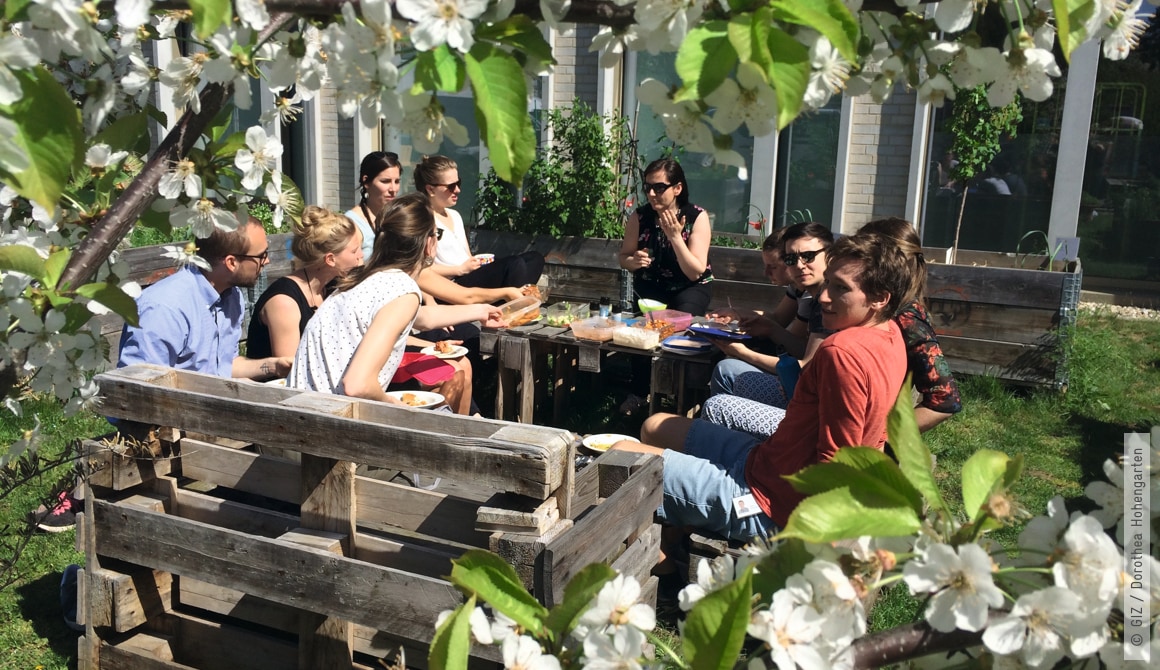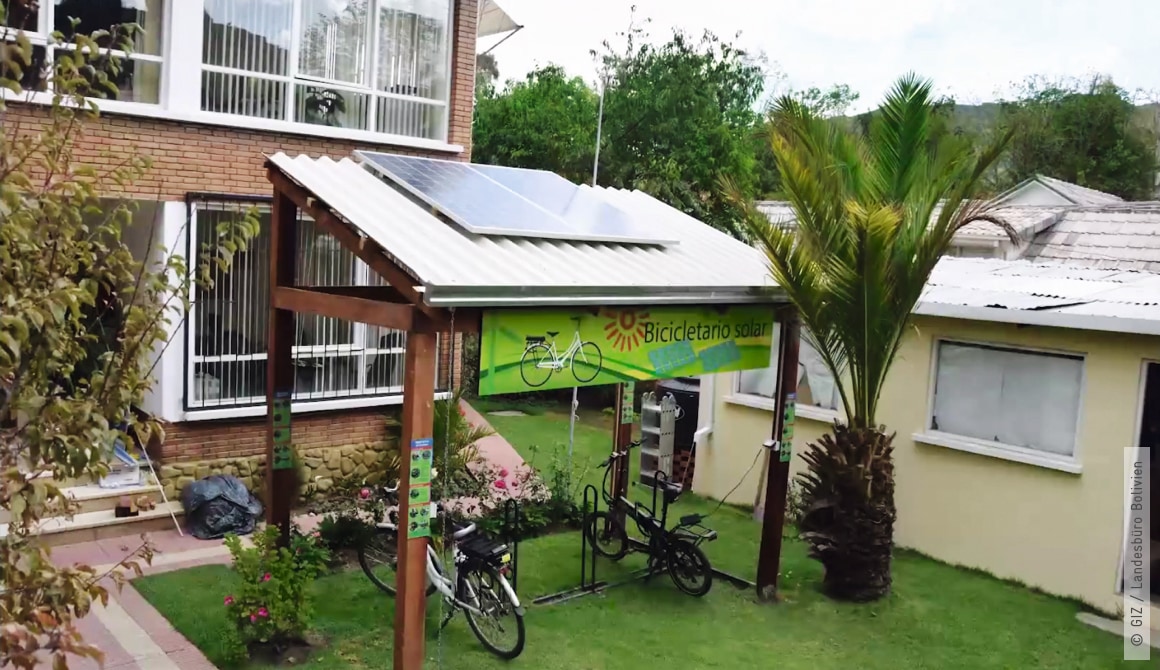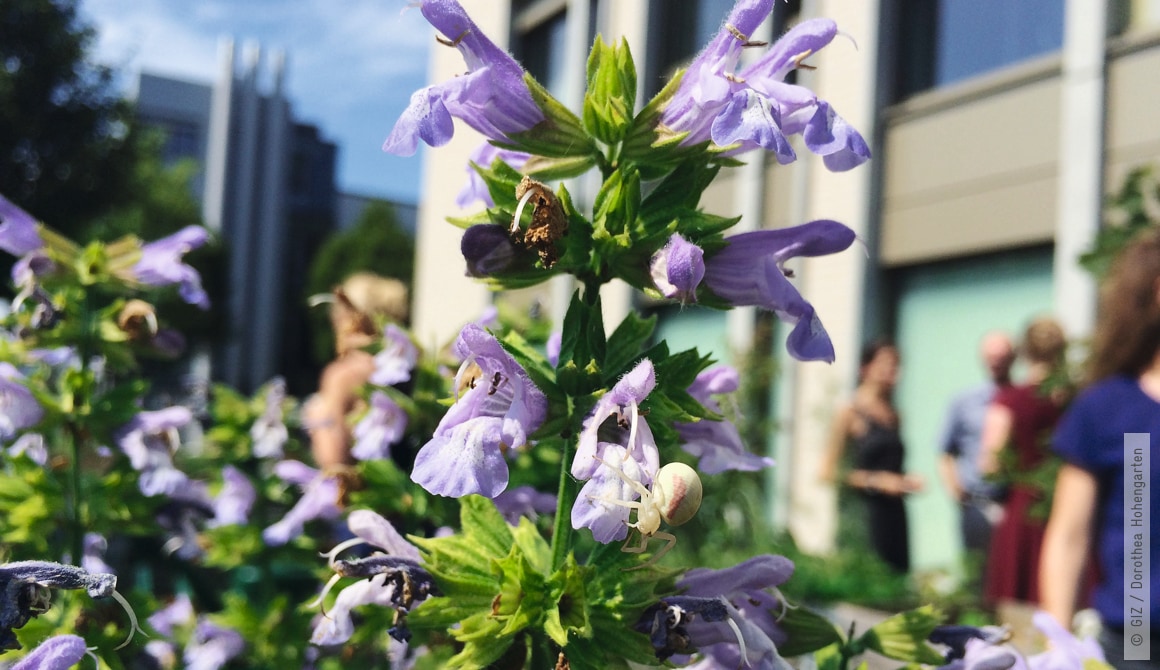ACHIEVING AMBITIOUS GOALS TOGETHER
Tackling climate change and protecting the environment matter to us all. We want to play a pioneering role in this, which is why we set ourselves the highest standards. For example, we are reducing our global CO2 emissions, aiming to make GIZ climate-neutral worldwide and encouraging our staff to choose environmentally friendly, healthy forms of mobility. A glance at our Environmental Programme shows how much we have already achieved.

SUSTAINABLE CONSTRUCTION: GOOD FOR PEOPLE AND THE ENVIRONMENT
Kottenforst Campus – If a training facility has its own day-care centre and is surrounded by nature, a lot of the right boxes have already been ticked. The Academy for International Cooperation (AIZ) moved into its new campus on the edge of the Kottenforst nature park near Bonn in January 2018. The building complex, with much wood and glass on show, has even more to offer: it was built to meet the standards of the gold certificate awarded by the German Sustainable Building Council (DGNB). This means, for instance, that the buildings are run on an almost carbon-neutral basis, and rely totally on green electricity. Staff can now complete their preparations for assignments abroad and other training courses in style: their children are in good hands, and the environmentally friendly surroundings help them both learn and switch off.
EMAS – These four letters stand for the most demanding level of certification in corporate environmental management: the Eco-Management and Audit Scheme. GIZ voluntarily committed itself to the scheme, and we have now fully met the target we set ourselves in our Environmental Programme: in 2018, several buildings received EMAS validation, including the new Kottenforst Campus, a building in Eschborn and a site in Berlin. This means that all of GIZ’s major locations in Germany now have the sought-after quality certification. This was a significant challenge for the EMAS environmental management officer and for the staff of the Property Division, for example, because the requirements of the EMAS regulation had been raised once again at the end of 2017.
Campus 2020 – The new GIZ campus in Bonn is due to be completed by the end of 2019. The Meander Building was officially opened in 2015, and now a six-storey structure with 28,000 square metres of floor space is being added to it. The new building, too, is being constructed to the highest standards, and once finished will be awarded a gold certificate by DGNB. Some of its climate-friendly properties include its use of rainwater and of waste heat from the computer centre. The new campus also represents progress in an entirely different respect: all 1,100 or so staff, who currently work at several locations spread across Bonn and the surrounding area, will be brought together on one site. This means more people meeting face-to-face and exchanging ideas.

CLIMATE NEUTRALITY: DOWN WITH GREENHOUSE GASES!
Avoid, reduce, offset – this is GIZ’s chosen sequence for dealing with greenhouse gas emissions. Following this principle, it is striving to achieve climate neutrality worldwide for 2020. Average annual CO2 emissions per GIZ staff member have fallen by 4.6 per cent since 2015. The aim is to reduce per-capita emissions by 2.5 per cent per year. GIZ has set up its own project in Thailand that it uses to offset its CO2 emissions. The steps taken by GIZ mean that it is also contributing to the German Federal Ministry for Economic Cooperation and Development’s target of becoming climate neutral.
MOBILITY: RIDE A BIKE!
If you ride a bike you have every right to take the moral high ground – because no other means of transport has so many things going for it. Bikes are climate-friendly, quiet and compact, and good for your health besides. Not only that, in cities they are also the quickest way of travelling distances of less than five kilometres. This is why, in 2018, GIZ further increased its emphasis on promoting cycling as the centrepiece of sustainable mobility. With this in mind, it had new bike stands installed, for example, and at events it put bike-riding staff in touch with technicians who inspected and repaired the bikes. In response, the German Association of Environmental Management e.V. (B.A.U.M.) recognised our Eschborn, Bonn and Berlin locations as cycle-friendly. Numerous colleagues are also committed to sustainable mobility at international level, too. The country office in La Paz, Bolivia, for instance, installed a charging station for e-bikes, proving that bike-riding is even possible at an altitude of 3,600 metres.
SUSTAINABILITY CONTEST: EXAMPLES OF ECO-FRIENDLY IDEAS
When GIZ ran its new Sustainability Champions contest, 30 teams from around the world applied. The number of entries in the ‘ecological balance’ category was particularly high. The initiatives submitted by the teams ranged from reducing flight-related CO2 emissions to protecting bees and avoiding plastic waste. In Kenya, GIZ’s Civil Peace Service launched a campaign to collect and recycle its waste, in collaboration with a local partner. The campaign is helping to raise awareness of how to deal with waste, while also avoiding 422 kilogrammes of CO2 emissions per year. Our office in Liberia has installed a photovoltaic system on its roof and is now getting its electricity from renewable solar power. The contest was so successful that it will now be repeated every two years. There are brief profiles of the five winners here.

ENVIRONMENTAL PROGRAMME 2016-2020: RESOURCE CONSERVATION AND SUSTAINABLE PROCUREMENT
We have already achieved a lot with our Environmental Programme. We now record CO2 emissions in a large proportion of our country offices through the Corporate Sustainability Handprint® (CSH). We are also recording CO2 emissions for key materials and equipment purchased in Germany, such as laptops, monitors, desktop PCs and cars, on a trial basis. We look for potential reductions in all areas, or devise measures to avoid or reduce emissions. In recent years, we have specified the most demanding sustainability criteria in many general tenders. We are still working intensively on many goals, including developing principles of sustainable procurement for the key product and service groups. We aim to put these principles into practice in our country offices, too, and are working on incorporating environmental and social criteria into invitations to tender for services, materials and equipment there.